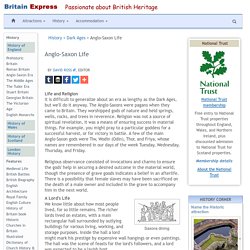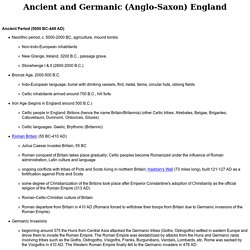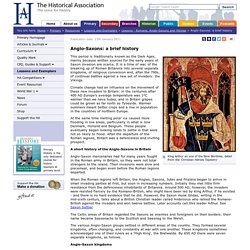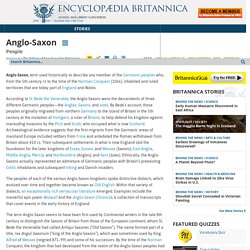

Anglo-Saxon Resources - Ravensgard. Anglo-Saxon life. Life and Religion It is difficult to generalize about an era as lengthy as the Dark Ages, but we'll do it anyway.

The Anglo-Saxons were pagans when they came to Britain. They worshipped gods of nature and held springs, wells, rocks, and trees in reverence. Religion was not a source of spiritual revelation, it was a means of ensuring success in material things. For example, you might pray to a particular goddess for a successful harvest, or for victory in battle. A few of the main Anglo-Saxon gods were Tiw, Wodin (Odin), Thor, and Friya, whose names are remembered in our days of the week Tuesday, Wednesday, Thursday, and Friday. Religious observance consisted of invocations and charms to ensure the gods' help in securing a desired outcome in the material world, though the presence of grave goods indicates a belief in an afterlife.
Saxons dining A Lord's LifeWe know little about how most people lived, for so little remains. Below the thanes and ceorls were the slaves. Anglo-Saxon Culture. Michael Delahoyde Washington State University History: When Rome was weakening early in the fifth century c.e., troops in the outlying regions, including the British Isles, were withdrawn.

Walls, roads, and baths remain even now. They also left the native Celts and Celtic-speaking Britons somewhat christianized, and Picts and Scots in the north, but "political" power fell to unstable tribal units. One of these leaders, Vortigern, "invited" Angles, Saxons, and Jutes to join his military power, so the land saw a swell of invasions by Jutes -- a germanic tribe from Denmark -- in 449, followed soon by Angles and Saxons. (The current name originates as "Angle-Land. ") The Anglo-Saxon social structure consisted of tribal units led by chieftains ("kings," or "lords") who, theoretically at least, earned their respect from their warriors (or "retainers," or "thanes," the group being called a "comitatus").
In 597 St. Language and Style: Old English is not uniform. Works Consulted Mursell, Gordon. Anglo-Saxon Period. Ancient Period (5000 BC-449 AD) Neolithic period, c. 5000-2000 BC, agriculture, mound tombs Non-Indo-European inhabitants New Grange, Ireland, 3200 B.C., passage grave.

Stonehenge I & II (2800-2000 B.C.) Bronze Age, 2000-500 B.C. Indo-European language, burial with drinking vessels, flint, metal, farms, circular huts, oblong fields Celtic inhabitants arrived around 750 B.C., hill forts Iron Age (begins in England around 500 B.C.) Germanic (Anglo-Saxon) England (449-1066 AD) Links: Anglo-Saxons: a brief history. Publication date: 13th January 2011 King Arthur as one of the Nine Worthies, detail from the 'Christian Heroes Tapestry' This period is traditionally known as the Dark Ages, mainly because written sources for the early years of Saxon invasion are scarce.

It is a time of war, of the breaking up of Roman Britannia into several separate kingdoms, of religious conversion and, after the 790s, of continual battles against a new set of invaders: the Vikings. Climate change had an influence on the movement of these new invaders to Britain: in the centuries after 400 AD Europe's average temperature was 1°C warmer than we have today, and in Britain grapes could be grown as far north as Tyneside. Warmer summers meant better crops and a rise in population in the countries of northern Europe.
At the same time melting polar ice caused more flooding in low areas, particularly in what is now Denmark, Holland and Belgium. Anglo-Saxon. Anglo-Saxon, term used historically to describe any member of the Germanic peoples who, from the 5th century ce to the time of the Norman Conquest (1066), inhabited and ruled territories that are today part of England and Wales.

According to St. Bede the Venerable, the Anglo-Saxons were the descendants of three different Germanic peoples—the Angles, Saxons, and Jutes. By Bede’s account, those peoples originally migrated from northern Germany to the island of Britain in the 5th century at the invitation of Vortigern, a ruler of Britons, to help defend his kingdom against marauding invasions by the Picts and Scotti, who occupied what is now Scotland. Archaeological evidence suggests that the first migrants from the Germanic areas of mainland Europe included settlers from Frisia and antedated the Roman withdrawal from Britain about 410 ce. The peoples of each of the various Anglo-Saxon kingdoms spoke distinctive dialects, which evolved over time and together became known as Old English. History - Ancient History in depth: Overview: Anglo-Saxons, 410 to 800. History - Ancient History in depth: The Anglo-Saxons.